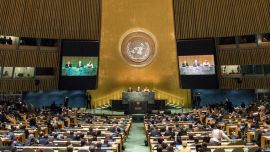Despite their government’s repudiation, 72% of the British people agreed with the use of the name Malvinas to refer to the South Atlantic islands by the European Union (EU), according to an online poll by the Daily Express started last Thursday, still ongoing and with people still taking part.
Even though the newspaper which published the poll holds a conservative, right-wing stance critical of the EU, its readers leaned towards tolerance of the idea of naming the islands as “Malvinas”, rather than “Falklands”. Only 28% stated that the EU was “out of order”, when it signed a treaty with CELAC with both names.
The European Union triggered the conflict with the United Kingdom after signing a treaty with Argentina where it referred to the Malvinas Islands using that name, rather than “Falklands”. The joint statement, backed by the EU and 32 members of the Latin American countries of the CELAC, used both names for the archipelago.
The spokesperson of British Prime Minister Rishi Sunak criticised the “regrettable choice of words” used by the EU. In addition, English conservative MP James Sunderland, who served in the South Atlantic War, said: “This is outrageous. The UK has exercised de facto sovereignty over the Falkland Islands since 1833 and went to their defence in 1982”.
“The good people of the Falklands have also overwhelmingly voted to remain British. The EU would be wise to respect British sovereignty, rather than waste its time with tokenism”, Sunderland said.
A source of the British Foreign Office also stated likewise: “The Argentine government can push whoever they want, but that does not change the fact that the Falkland Islands are British. That is the clear will of its inhabitants. Our commitment to that decision is unshakeable and will continue to be so”.
A spokesman for the European External Action Service, the Foreign Affairs body of the European Union, in turn, said: “EU member states have not changed their views on the Falklands/Malvinas Islands”.
“The EU is in no position to express any stance given there had been no discussion of the matter at the Council of the EU. The EU does not take any position on such issues without a Council mandate”, he clarified.
“99.8% of Falkland Islanders voted to be part of the UK family. Argentina and the EU should listen to their democratic choice", the head of British diplomacy, James Cleverly, tweeted.
What Argentine authorities said
Given Cleverly’s response, the response by Foreign minister Santiago Cafiero came swiftly: “Dear Secretary James Cleverly: the United Kingdom has violated Argentina’s territorial integrity for 190 years”, published.
“The alleged ‘referendum’ you invoke has no value under International Law, nor does it modify the stipulations of over 50 United National resolutions, or the United Kingdom’s obligation to put an end to colonialism in all its forms and solve the dispute peacefully”, Cafiero added.
As for the final statement EU-CELAC summit, Cafiero said: “This joint statement is a new call by the international community for the United Kingdom to abide by its obligation to resume sovereignty negotiations with Argentina”.
President Alberto Fernández celebrated: “We have taken one step further, a historic diplomatic victory: an entire people has taken Malvinas to a bi-regional statement”.
In Spanish, the document only mentions the “Malvinas Islands” and, paragraph 13 reads: “Regarding the question of sovereignty over the Islas Malvinas / Falkland Islands, the European Union took note of CELAC's historical position based on the importance of dialogue and respect for International Law in the peaceful solution of disputes".
The South Atlantic archipelago, located 400 kilometres off the Argentine coast and nearly 13,000 km from the United Kingdom, was the setting of a 74-day war in 1982, which killed 649 Argentines and 255 British soldiers. A UN resolution in 1965 acknowledged a conflict for the sovereignty over the territory and encouraged both countries to negotiate.
– TIMES/PERFIL




















Comments